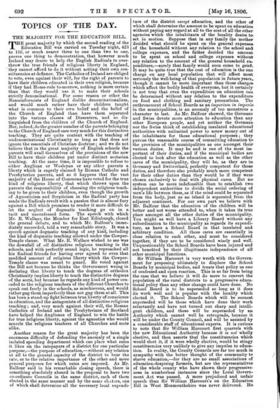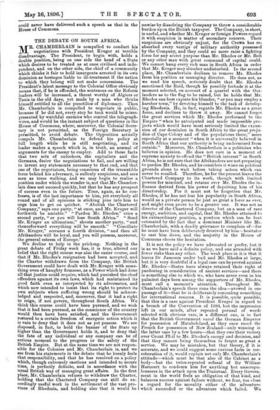TOPICS OF THE DAY.
THE MAJORITY FOR THE EDUCATION BILL. THE great majority by which the second reading of the Education Bill was carried on Tuesday night, 423 to 156, or much nearer three to one than two to one, proves one thing to demonstration, that however much Ireland may desire to help the English Radicals to over- throw the true friends of religious liberty in England, they cannot afford to do it without setting their own con- stituencies at defiance. The Catholics of Ireland are obliged to vote, even against their will, for the right of parents to have their children educated in their own religion, because if they had Home-rule to-morrow, nothing is more certain than that they would use it to make their schools strictly denominational. For some reason or other the Nonconformists of England dislike denominationalism, and would much rather have their children taught what is common to their own belief and the belief of the Church of England than have them separated into the various classes of Dissenters, and so dis- tinguished from the children of the Church of England. Nor, indeed, do the greater number of the parents belonging to the Church of England care very much for this distinctive teaching. They are quite content with the teaching of undenominational Christianity so long as that does not ignore the essentials of Christian doctrine ; and we do not believe that in the great majority of English schools the parents will avail themselves of the provisions of the new Bill to have their children put under distinct sectarian teaching. At the same time, it is impossible to refuse to either Anglican or Wesleyan or any other parents a liberty which is eagerly claimed by Roman Catholic and Presbyterian parents, and so it happens that the vast majority of the House of Commons have voted for the true kind of religious liberty, that which throws upon the parents the responsibility of choosing the religious teach- ing to be given to their children, even though the growth of Agnosticism and Scepticism in the Radical party has made the Radicals revolt with a passion that is almost fury against a Bill which promises to render it more difficult to let the neglect of dogmatic teaching go on in a tacit and unconfessed form. The speech with which Mr. R. Wallace, the Member for East Edinburgh, closed the general debate, and to which Mr. Balfour's imme- diately succeeded, told a very remarkable story. It was a speech against dogmatic teaching of any kind, including the kind of dogmatic teaching allowed under the Cowper- Temple clause. What Mr. R. Wallace wished to see was the downfall of all distinctive religious teaching in the schools, and with perfectly sound logic, he reproached all his Radical friends for having ever agreed to even that modified amount of religious liberty which the Cowper- Temple clause was meant to guard. He voted against the Bill not because he thinks the Government wrong in declaring that liberty to teach the dogmas of orthodox Christianity implies liberty to teach the distinctive dogmas of the sects, but because he regards any kind of power con- ceded to the religious teachers of the different Churches to speak out freely in the schools, as mischievous, and would rather gag them imperfectly than not gag them at all. This has been a stand-up fight between true liberty of conscience in education, and the antagonists of all distinctive religious teaching ; and, very much against their will, the Roman Catholics of Ireland and the Presbyterians of Scotland have helped the Anglicans of England to win the battle for true religious liberty, against the agnostics who would muzzle the religious teachers of all Churches and sects alike.
Another reason for the great majority has been the enormous difficulty of defending the anomaly of a single isolated spending department which can place what rates it likes on the ratepayers of a district for one particular purpose,—the purpose of education,—without any relation at all to the general capacity of the district to bear the rate, or to the relative importance of the other and more general purposes for which rates are imposed. As Mr. Balfour said in his remarkable closing speech, there is something absolutely absurd in the proposal to have two co-ordinate Councils in the same district, each of them elected in the same manner and by the same eltaars, one of which shall determine all the necessary local expendi- iure of the district except education, and the other of which shall determine the amount to be spent on education without paying any regard at all to the cost of all the other agencies which the inhabitants of the locality desire to set in motion. Suppose that in any family the mother decided what should be spent on the general expenses. of the household without any relation to the school and college expenses, and the father decided the amount to be spent on school and college expenses without any relation to the amount of the general household ex- penditure,—surely that family would soon come to grief. It may be quite true that the cost of education is the one charge on any local population that will affect most seriously the well-being of that population in future years,. though it cannot be more important than those charges. which affect the bodily health of everyone, but it certainly- is not true that even the expenditure on education can be determined without any relation to the expenditure on food and clothing and sanitary precautions. The enthronement of School Boards as an imperinm in imperiei in the municipalities, is an anomaly of too monstrous a character to last. As Mr. Balfour showed, the Germans and Swiss devote more attention to education than any other European people, and yet neither the Germans nor the Swiss think of establishing insulated educational authorities with unlimited power to screw money out of the inhabitants for those educational purposes ; they pursue the reasonable course of committing education to provision of the municipalities as one amongst their various duties. It may be and is one of the most im- portant of their duties, and if the municipal bodies are elected to look after the education as well as the other cares of the municipality, they will be, as they are in Germany and Switzerland, perfectly competent for those duties, and therefore also probably much more competent for their other duties than they would be if they were chosen exclusively to deal with physical cares. But no system can be more indefensible than to establish two independent authorities to divide the social ordering of men's life between them, as if the mind could be separated from the body, just as an island is separated from the adjacent continent. For our own part we believe with Mr. Balfour that the education of the children will be better and not worse attended to, when it takes its true place amongst all the other duties of the municipality. You might as well have a Library Board without any subordination to the municipality as regards its expendi- ture, as have a School Board in that insulated and arbitrary condition. All these cares are essentially in close relation to each other, and must be considered together, if they are to be considered wisely and well. Unquestionably the School Boards have been injured and not benefited by their illegitimate independence of all other municipal functions. Sir William Harcourt is very wroth with the Govern- ment for proposing ultimately to displace the School Boards by municipal bodies, and treats that policy as one of confessed and open reaction. This is so far from being the case that we believe it will do more to convert the population of the rural districts to a progressive educa- tional policy than any other change could have done. No School Board is to be superseded so long as it does its work well and is popular with the locality which elected it. The School Boards which will be soonest superseded will be those which have done their work reluctantly and have not turned out sharp and intelli- gent children, and these will be superseded by an Authority which cannot well be retrograde, because it will be under the County Council, and will be assisted by a considerable staff of educational experts. It is curious to note that Sir William Harcourt first quarrels with the new Educational Authority because it is not wholly elective, and then asserts that the constituencies which would elect it, if it were wholly elective, would be stingy constituencies very unlikely to give any impulse to educa- tion. In reality, the County Councils are far too much in sympathy with the better thought of the community to starve education,—for they are no small associations of education-despising farmers, but are the representatives of the whole county who have shown their progressive- ness in numberless instances since the Local Govern- ment Act was passed. A more prejudiced and unfair speech than Sir William Harcourt's on the Education Bill in West Monmouthshire was never delivered. He could never have delivered such a speech as that in the House of Commons.







































 Previous page
Previous page